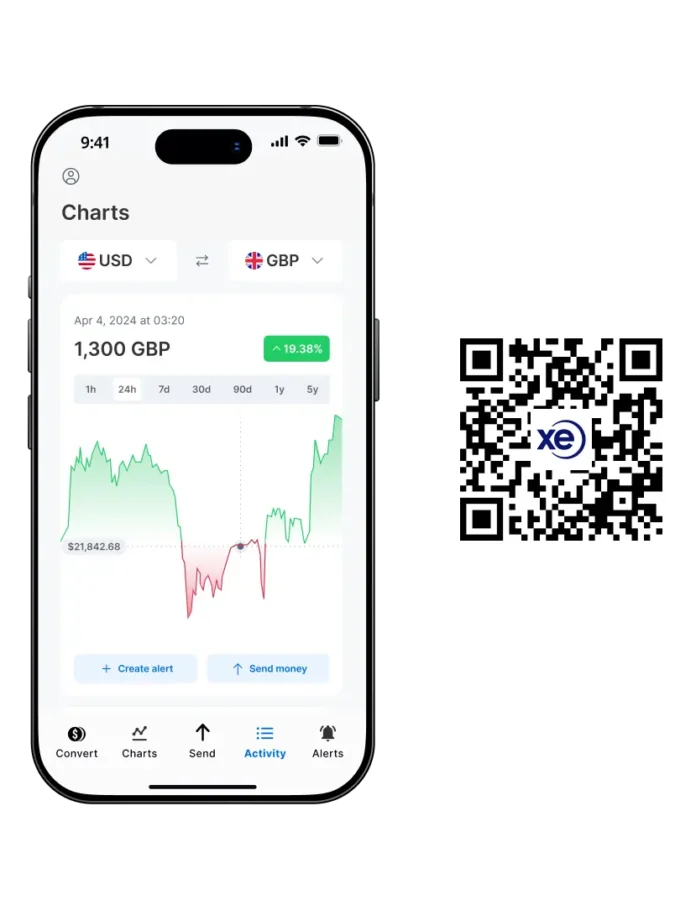How Traditional Banks Set Exchange Rates
Traditional banks typically apply a spread—a hidden markup—on top of the mid‑market (interbank) rate. This spread can range anywhere from 1% to 5% or more, depending on the bank and currency pair. The spread covers the bank’s costs and profit margin but is often not disclosed upfront to customers.
- Wide Spreads: Banks may quote you a “sell” rate that appears competitive but includes a hidden spread of 2–3% above the mid‑market rate.
- Flat Fees: In addition to the spread, banks often charge flat fees—ranging from $10 to $35 per international wire transfer.
- Batch Processing: Many banks only process international payments once or twice per day, which can introduce timing risk if rates move unfavorably between valuation and execution.
- Inconsistent Policies: Rates can vary widely between branches, account types, and even customer relationship levels—making it hard to know exactly what you’ll pay until after the transaction is executed.
XE’s Mid‑Market Approach
XE Money Transfer stands out by offering the mid‑market rate—the midpoint between buy and sell rates on the global FX market—plus a small, fully transparent margin. This means what you see is what you get, with no hidden spreads.
- Live Mid‑Market Rates: XE’s platform sources real‑time interbank rates and updates them every few seconds.
- Transparent Margin: Instead of hiding a large spread, XE applies a modest markup (typically 0.5–1.5%) that is clearly disclosed before you confirm any transaction.
- Flat or No Fees: For most currency corridors, XE charges a small flat fee (around $3–$5) on smaller transfers, and waives fees on larger amounts.
- Rate Holds: You can lock in a quoted rate for up to 24 hours, protecting you from market volatility while you prepare your funds.
Also read: Pippit AI vs. Traditional Editing: Cutting Production Time by 80%
Real‑World Rate Comparison
Let’s compare the total cost on a hypothetical $5,000 USD transfer to EUR using both a typical bank and XE Money Transfer:
| Provider | Mid‑Market Rate | Offered Rate | Spread % | Flat Fee | Amount Received (EUR) |
|---|---|---|---|---|---|
| Big Bank A | €0.9200 | €0.9020 | 1.96% | $25 | €4,535.00 |
| Big Bank B | €0.9200 | €0.9064 | 1.50% | $15 | €4,532.00 |
| XE Money Transfer | €0.9200 | €0.9124 | 0.84% | $5 | €4,560.20 |
In this example, XE delivers over €25 more than even the most competitive bank, thanks to its tighter spread and lower fees. When you repeat transfers monthly or quarterly, those savings compound significantly.
Hidden Costs to Watch For
Even with transparent providers, certain charges can erode your savings if you’re not careful:
- Intermediary Bank Fees: Some currency corridors require correspondent banks to route payments; these intermediaries may deduct small processing fees.
- Recipient Bank Fees: The beneficiary’s bank can impose inbound wire fees or currency conversion charges on their end.
- Delayed Processing: If a provider holds funds due to compliance or cut‑off times, you might miss favorable rates or incur additional banking fees.
XE notifies you upfront if a corridor commonly incurs intermediary deductions, and allows you to choose alternative corridors (e.g., via a different currency pivot) to minimize extra charges.
Case Study: Freelancer vs. Bank
Maria, a graphic designer based in Mexico City, invoices her U.S. clients in USD. She typically receives $2,000 per month. Here’s her annual savings by switching from her bank to XE:
| Metric | Traditional Bank | XE Money Transfer |
|---|---|---|
| Invoice Amount (USD) | $2,000 × 12 months = $24,000 | |
| Average Spread | 2.5% | 0.8% |
| Flat Fees Annual | $25 × 12 = $300 | $5 × 12 = $60 |
| Total Euros Received | €21,780 | €22,240 |
| Annual Savings | €460 (approx. $500) | |
By moving to XE, Maria keeps nearly €500 more each year—enough to upgrade her design software or invest in professional development.
Tips for Choosing the Best Provider
- Always Compare Final Amount: Focus on the “amount received” after all fees and margins, not just the advertised rate.
- Check Cut‑Off Times: Early submission often means same‑day processing; missing deadlines can delay funds and expose you to rate swings.
- Use Rate Alerts: Services like XE let you set a target mid‑market rate and notify you when reached.
- Review Support Options: 24/5 live chat and phone support can be invaluable if you encounter issues or need guidance.
- Consider Transfer Frequency: Batch high-value payments when possible to reduce flat fees, or enroll in regular payment plans for subscriptions and payroll.
Pros & Cons Summary
| Feature | Traditional Banks | XE Money Transfer |
|---|---|---|
| Exchange Rate Transparency | Poor (hidden spreads) | Excellent (live mid‑market + transparent margin) |
| Fees | $10–$35 per transfer | $3–$5 or waived |
| Speed | 2–5 business days | Same day to 1–2 days |
| Support | Branch hours or limited call center | 24/5 live chat, phone, email |
Conclusion
When you compare XE Money Transfer to traditional banks, the difference in cost and clarity becomes clear. XE’s commitment to mid‑market rates, low flat fees, and transparent margin structure typically results in significantly better rates and higher amounts received. If you’re tired of hidden markups and want a modern, user‑friendly experience, it’s time to make the switch. Create your XE account now and start saving on every international transfer.
Don’t let outdated banking models eat into your hard‑earned money. Sign up for XE Money Transfer today and benefit from real‑time mid‑market rates, low fees, and exceptional support.

